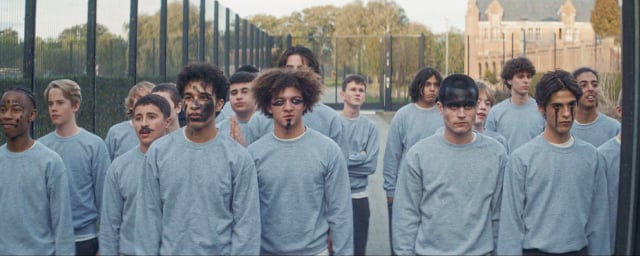For his first feature film, “Le Paradis”, Zeno Graton tells a love story between the walls of a center for delinquents. Meeting with the director.
Within the walls of an educational center for juvenile delinquents, Joe (Khalil Gharbia) catches the eye of William (Julien De Saint-Jean), the newcomer. From this meeting, at first timid, is born a desire that upsets the balance of this closed environment where each gesture is scrutinized.
With Le Paradis, Zeno Graton directs his first film and tells the story of a love that rises up against an institutional system.
This project was born when the filmmaker saw his own cousin go through these centers. Beyond a learning story, Zeno Graton also wants to point the finger at a more punitive than restorative care that is not always effective.
“I want to demonstrate that the mechanisms that lead to delinquency are above all linked to a system, to systemic racism, to precariousness and to a lot of things.he explains. It’s not just an individual responsibility..”
To carry out his research, the Belgian director contacted the Ministry of Youth Aid in Brussels with the aim of immersing himself in one of these centers, called IPPJ (Public Institutions for the Protection of Youth) . For a month, Zeno Graton spending time with teenagers. He takes their word and wins their trust.
Flint Films
“At the end of the writing, I returned three weeks to the centerhe continues. There were new young people and this new survey allowed me to follow up and observe what had gone wrong. I was able to see that there were malfunctions and that’s what I wanted to say.”
In the conception of his heroes, the filmmaker wants to avoid clichés and is inspired by a queer cinema that is more uninhibited and free from shame. “I think that today, young people want to identify with and dream of the possibility of loving without being told that they are victims and that there is oppression.”, he adds.
With this film, I want to normalize tolerance.
Far from the harshness of Alan Clarke’s Scum – which shows the hell of the reformatories in England under the Thatcher government -, Le Paradis goes against pre-established codes.
“I want to show the possibility of being a boy other than through the attributes that are normally linked to masculinity”, specifies Zeno Graton, who cites Jean Genet as an inspiration.
The film reverses the equation and speaks more of a masculine solidarity that radiates over an entire group. “We have a role in cinema to infuse the culture of our time with performances that will have an effectsays the director. With this film, I want to normalize tolerance. Of course, there is a form of utopia, but I assume to tend towards that.”

Flint Films
Carried by a young generation of actors, Le Paradis confirms the talent of Khalil Gharbia (Peter von Kant, The Seven Lives of Lea) and Julien De Saint-Jean (Stop with your lies). Chosen after a long casting, the actors integrated a real center during their rehearsals so that they could communicate with the young people.
Zeno Graton remembers the reaction of a teenager on the spot: “He couldn’t believe we were about to make this movie. He said: ‘It’s not possible, nobody cares about us.’ From then on, all the actors felt invested with a mission: to transmit as well as possible the word of these young.”
Interview by Thomas Desroches, in Paris, May 3, 2023.
Zeno Graton’s Paradise, in theaters May 10, 2023.
